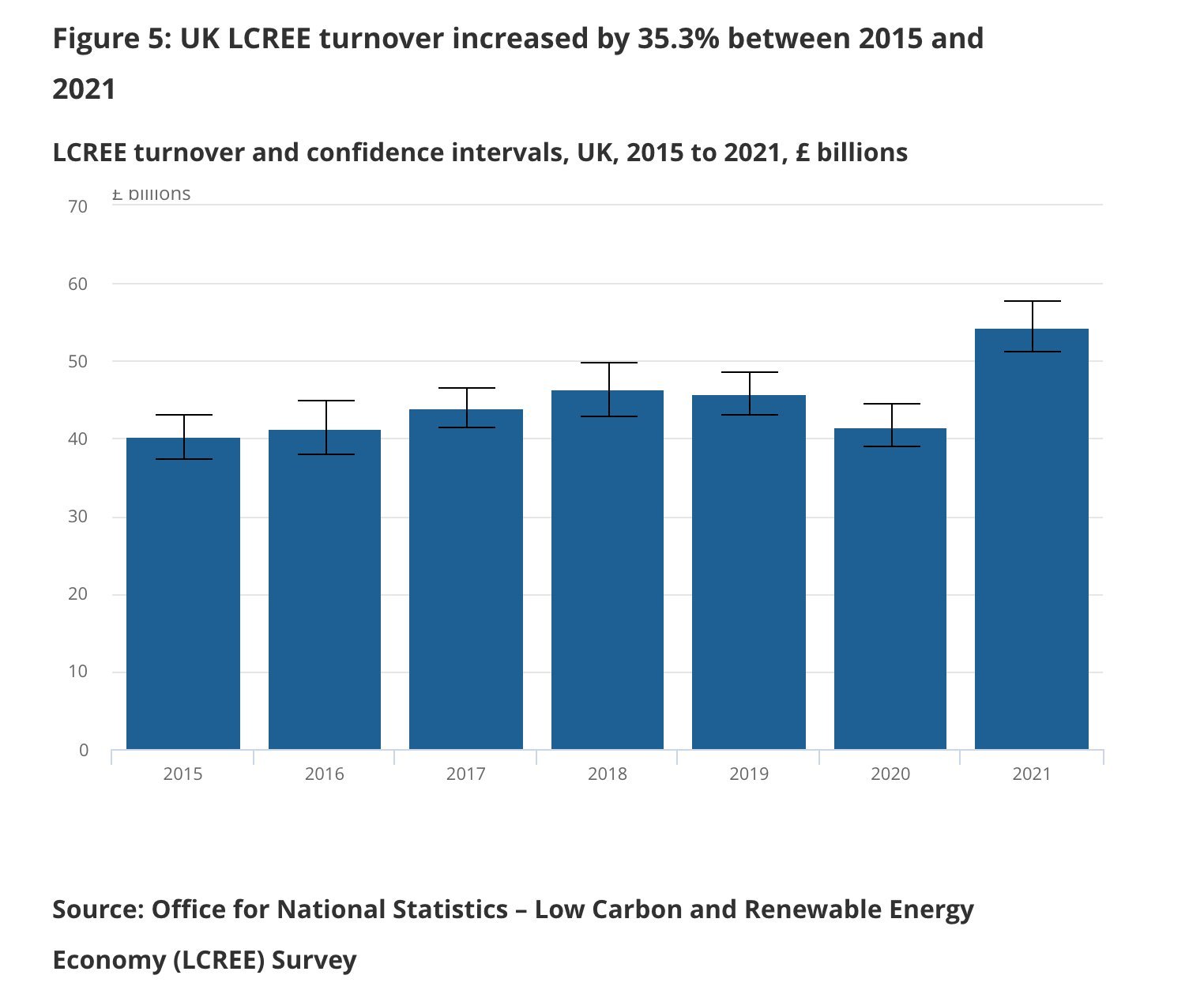Bringing energy into the 21st Century
Net zero is "the economic opportunity of the 21st century”
According to an independent review commissioned by Conservative former energy minister Chris Skidmore. The "mission zero" report includes 129 recommendations to "turbocharge" climate action in the UK. Over 50% have a 2023 deadline.
In less than two months, the UK Government's energy subsidy stops, with prices set to soar. Finding intelligent, long-term solutions have never been more vital.
💡 Here are our top observations from news and events on all things energy.
According to the ONS, the UK's green economy has grown 35% since 2015.
Low carbon and renewable energy economy (LCREE) turnover and employment estimates are both at their highest levels.
Solving the energy problem requires creating the right policies and systems, not just products and services.
Solving energy means joining up supply and demand. It also means recognising the challenges of today's system. An electric car can run a house for one week; charging an EV uses the equivalent of 1000 lightbulbs in a typical house.
A fundamental rethink of the system, the grid and government policy is needed to create a future-fit energy model.
Octopus Energy was born out of a frustration to bring energy and energy companies into the 21st Century. Kraken, its energy tech platform (based on advanced data, machine learning capabilities, and customer-centricity.), gives Octopus — and its licensees— the ability to create magical experiences that transform lives.
Running the system intelligently and with agility
Greg Jackson believes "controlling the technology allows you to drive change and pace. You are no longer waiting for another provider. Charging at different times gives flexibility and reduces the problem, i.e. network overload. In theory, this makes sense; in practice, it's more tricky. The average household with kids can't wait for their off-peak electricity to cook tea. Smart meters, better reporting and nudge theory are helpful but limited. Better batteries are also part of the solution.
Energy looks like a bill to the average consumer
Most consumers have no relationship with their provider, and why should they? Energy comes out of the socket. However, energy is on people's radar due to climate change, inflation and the cost of living crisis. But how much does better reporting actually help, i.e. hit the bottom line? Pretty graphs are a limited form of control. Households are still at the mercy of the markets and the energy provider. "The bill has been weaponised", according to the CEO of Octopus. "Boegy men include Putin, the industry." A brave government would rethink the power industry and change the commodity and its delivery.
Is success the end of the energy bill?
Interesting collaborations are house builders looking to install heat pumps and solar panels so that residents never have an energy bill. The investment pays itself in 3-4 years. With 400,000 new homes built a year, it could be a game changer. Others include thermal storage manufacturer Sunamp developing and trialling its advanced thermal storage system in 100 homes across the UK. The UK has one of Europe's oldest, least efficient housing stocks. We need innovative companies bringing solutions to these sectors not known as creative. Necessity is the mother of innovation.
Better regulation
This challenge is systemic. Collaboration and forward-thinking from the government are needed in energy (and a common theme industry-wide). Octopus wants to see two pieces of legislation: 1) the reduction of the average 7-10 years timeframe to build energy creators and grid connections, and 2) a review of the pricing model. Regulators must correct the myth that renewables are more expensive. Wind farms could be generating Scottish power for free. Instead, the UK pay to switch power off because of grid constraints. We are building the equivalent of butter mountains. We kick the can when we should bring the immediate benefits now.
A new approach to innovation
We all need help transitioning to Net Zero, especially low-income and vulnerable consumers. To address this, Energy Systems Catapult is testing initiatives to assess its market fit and develop practical, solution-focused regulation. From an industry perspective, Octopus Energy was warned the sector dinosaurs would never shift. The CEO compares business transformation to open-heart surgery with sympathy for leaders who often see that these endeavours never deliver. however, he warns, "it's a lot harder to play catch-up than create." His recommendation is to build the baby and then slowly migrate over. He cites a Mckinsey Quarterly article that argues the IT function is there to take orders from business, not the other way round.
🙌 Thanks to Greg Jackson, CEO of Octopus Energy, Claire Rowlands – Product management and design for IoT and clean energy tech innovation; and the Product Lead: Whole Energy Systems Accelerator, Simon Evans (Carbon Brief), and Chris Skidmore (UK Government)



